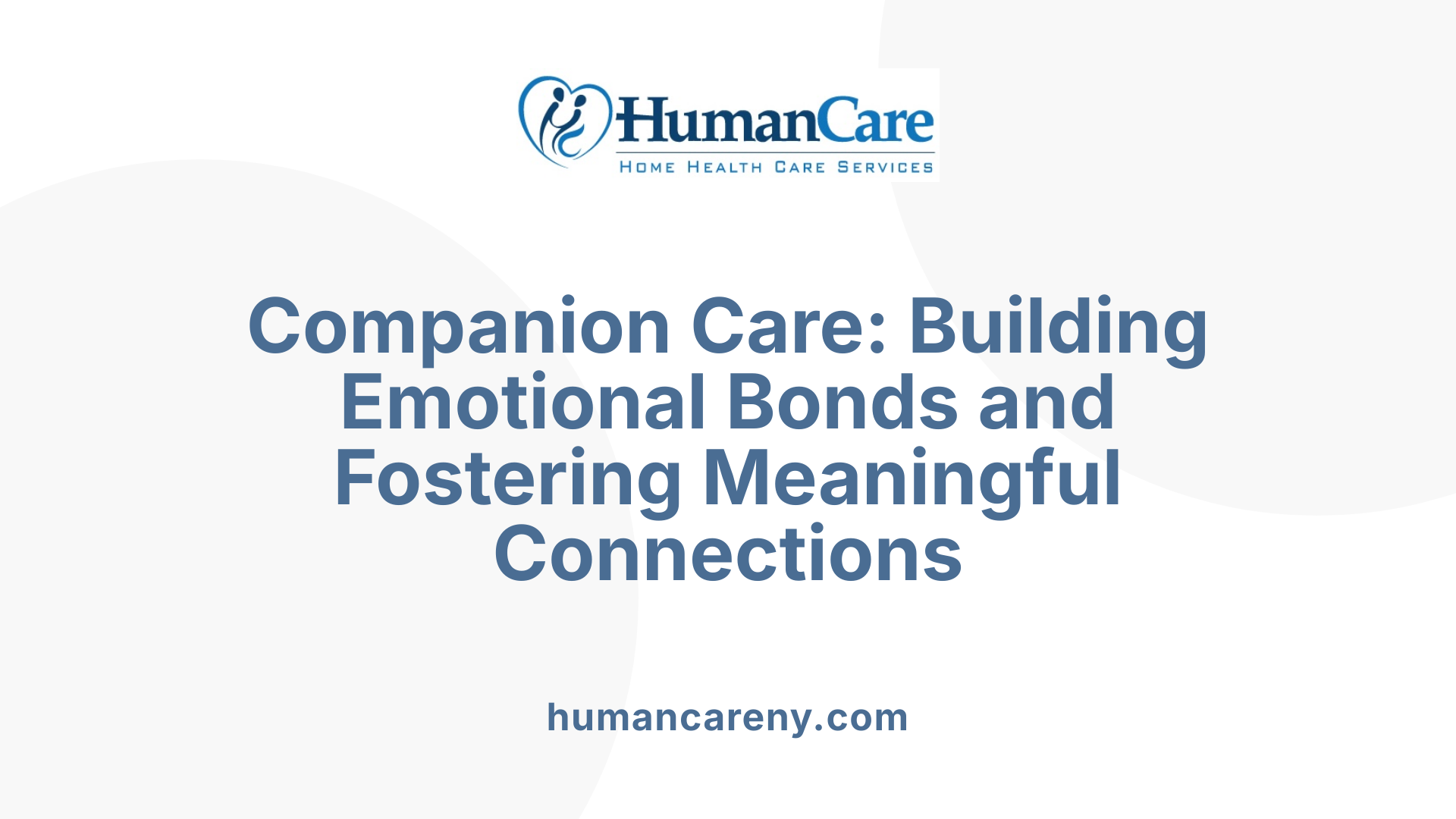Understanding the Impact of Companion Care on Cognitive Decline
Cognitive decline is a prevalent concern among seniors, often leading to challenges such as memory loss, social isolation, and difficulty managing daily routines. Companion care offers a multifaceted approach to support seniors in maintaining cognitive function and emotional well-being. By providing not only practical assistance but also social engagement and emotional support, companion care can play a critical role in reducing the progression of cognitive decline and enhancing quality of life for older adults.
Social Engagement and Emotional Support: Combating Loneliness and Cognitive Decline

Benefits of social interaction for cognitive health
Social interaction plays a crucial role in maintaining cognitive health among seniors. Engaging regularly in conversations, hobbies, and community activities can stimulate memory and mental sharpness. Studies show that seniors who frequently socialize experience a 70% lower prevalence of cognitive decline compared to those who are isolated. Social engagement encourages brain activity and emotional well-being, which slows the progression of diseases such as dementia.
How companion care reduces loneliness and depression
Companion care effectively addresses loneliness and depression by providing consistent social engagement and emotional support. Seniors often face the risk of social isolation, which increases the likelihood of depression, heart disease, and dementia. Companion caregivers foster meaningful relationships through friendly interactions, shared meals, and encouragement to participate in social outings. This regular connection helps combat feelings of sadness and anxiety, thereby improving overall mental health.
Emotional support and meaningful connections provided by companion caregivers
Caregivers offer more than practical assistance—they provide emotional reassurance and validation. Through empathetic listening and shared activities, companions build trust and meaningful bonds with seniors. This support helps manage mood swings and emotional instability, which are common in cognitive conditions like dementia. By promoting emotional stability, companion care enhances seniors' quality of life and creates a sense of belonging.
Impact of loneliness and social isolation on health risks like dementia and heart disease
Loneliness and social isolation among older adults contribute significantly to adverse health outcomes. Over one-third of individuals over age 45 experience loneliness, with nearly a quarter of seniors facing social isolation. This condition increases risks of stroke, heart disease, depression, and dementia by 50%. Regular social interaction, supported by companion care, mitigates these risks by encouraging mental engagement and emotional connection.
Activities that foster social engagement such as conversation, hobbies, and outings
Companion caregivers actively engage seniors through diverse activities to promote social interaction. These include meaningful conversations, reminiscence sessions, arts and crafts, music, games, and community outings. Physical activities like walks and gentle exercises are also encouraged, which improve mood and brain health. By tailoring activities to individual interests, companion care keeps seniors mentally stimulated and socially connected, contributing to healthier cognitive aging.
Mental Stimulation Through Activities and Routine Maintenance

How Do Cognitive Activities Like Games, Puzzles, Arts, Music, and Reminiscence Support Seniors with Dementia?
Engaging seniors in a variety of cognitive activities plays a significant role in supporting brain health. Games and puzzles stimulate problem-solving skills and memory recall, while arts and music offer creative outlets that foster emotional expression and cognitive engagement. Reminiscing about past experiences can promote mental stimulation by activating long-term memory and encouraging conversation.
Why Is Maintaining Daily Routines Important for Cognitive Function?
Structured daily routines provide seniors with a sense of stability and normalcy, which is especially beneficial for those with dementia. Consistent schedules help reduce confusion and anxiety, supporting better orientation to time and place. Maintaining routines can preserve cognitive function by reinforcing habitual behaviors, thus making daily tasks more manageable.
What Role Do Companion Caregivers Play in Encouraging Mental Exercises?
Companion caregivers actively encourage participation in mental exercises by initiating and facilitating activities such as reading, puzzles, and music sessions. They tailor these activities to the senior’s interests and capabilities, creating an engaging and supportive environment. Caregivers also provide reassurance and assist in managing mood changes during these sessions, enhancing emotional stability.
How Do These Activities Help Manage Dementia Symptoms and Memory Retention?
Regular engagement in cognitive activities helps slow the progression of dementia symptoms by stimulating neural pathways and promoting mental sharpness. Such activities aid memory retention by keeping the brain active and reducing the effects of social isolation and depression. This stimulation can improve mood and overall quality of life.
What Are Structured Activities for Seniors with Early-Stage Dementia?
For seniors in the early stages of dementia, companion care often includes tailored, structured activities designed to maintain cognitive function. These may involve scheduled games, memory exercises, arts and crafts, and social outings, all aimed at enhancing engagement, maintaining skills, and providing a safe, enriching routine.
Practical Assistance for Independence and Safety

Helping with Daily Activities: Meal Preparation, Hygiene, Light Housekeeping
Companion care aids seniors by supporting essential daily tasks such as preparing meals, assisting with personal hygiene, and performing light housekeeping duties. These activities help maintain seniors' independence and comfort in their homes, fostering a sense of normalcy and well-being.
Monitoring Safety Risks: Fall Hazards and Wandering Prevention
Caregivers vigilantly monitor the home for potential safety risks like fall hazards and take preventive measures to avoid wandering, especially important for seniors with dementia. This close supervision creates a safer environment and reduces the chances of accidents or injuries.
Meal Planning and Ensuring Proper Nutrition to Support Brain Health
Caregivers assist with meal planning and preparation to ensure seniors receive nutritious meals that support cognitive function. Proper nutrition is vital in maintaining brain health, and caregivers help by encouraging healthy eating habits and monitoring food and hydration intake.
Medication Reminders to Prevent Health Complications
Medication management is another critical role of companion caregivers. They provide reminders to take medications as prescribed, reducing the risk of complications from missed or incorrect dosages, which can significantly impact cognitive health and overall well-being.
Home Modifications and Environment Adjustments for Familiarity and Security
Small home modifications and adjustments to the living environment help reduce confusion and agitation for seniors, particularly those with dementia or Alzheimer's. Creating a familiar and secure setting supports emotional stability and enhances safety, enabling seniors to age in place more comfortably.
Physical Activity and Its Role in Supporting Brain Health

Encouragement and Facilitation of Physical Exercises Like Walking
Companion caregivers play an essential role in motivating and assisting seniors to participate in physical activities such as walking and light exercises. These activities are often tailored to individual capabilities, encouraging movement that supports overall health.
Connection Between Physical Activity and Improved Memory Retention
Physical activity is closely linked to enhanced brain function, aiding memory retention and slowing cognitive decline. Regular exercise helps maintain blood flow to the brain and supports the growth of new neural connections, which are crucial for mental sharpness.
How Companion Care Integrates Physical Activity Into Daily Routines
Companion care providers thoughtfully integrate exercises into seniors' daily routines through structured activities and outings. Simple movements like walking, stretching, or participating in gentle exercises improve physical and cognitive well-being.
Importance of Maintaining Physical Health to Slow Cognitive Decline
Maintaining physical health through activity not only promotes a better quality of life but also contributes significantly to slowing the progression of cognitive impairments. Companion care’s focus on consistent physical engagement helps seniors sustain independence and emotional well-being.
Supporting Families and Personalized Care Planning
How does companion care provide respite to reduce family caregiver stress and burnout?
Companion care offers crucial respite for family caregivers, allowing them to take necessary breaks without worry. This support helps reduce stress and burnout, enabling family members to maintain their well-being and provide quality care when they return. By entrusting professional caregivers, families regain valuable time for their own needs.
What role do tailored care plans play in addressing cognitive and emotional needs?
Tailored care plans are fundamental in meeting each senior’s unique cognitive and emotional challenges. These individualized strategies are designed after thorough assessments and consider the senior’s personality, preferences, and health condition. Such plans promote better memory care by focusing on activities and routines that stimulate cognitive function and improve emotional stability.
How do families and caregivers collaborate to enhance memory care?
Effective memory care thrives on collaboration between families and in-home caregivers. Families provide valuable insights into the senior’s history and preferences, which caregivers use to personalize daily activities and behavioral approaches. This partnership ensures continuity and consistency in care, aiding cognitive health and emotional well-being.
How is companion care customized based on personality and interests?
Companion care services offer flexibility by matching caregivers carefully with seniors based on shared interests and compatible personalities. Whether it’s engaging in hobbies, outings, or calm conversation, this thoughtful matching enhances social engagement and emotional fulfillment, making the care experience more meaningful and enjoyable.
How does companion care offer peace of mind through consistent and compassionate support?
Knowing that a loved one receives compassionate and reliable care around the clock or during scheduled times gives families peace of mind. Consistent support from professional caregivers not only ensures safety and daily assistance but also fosters emotional comfort for seniors, thereby alleviating family concerns and strengthening trust.
The Comprehensive Benefits of Companion Care for Cognitive Wellness
Companion care emerges as a profound support system in the fight against cognitive decline among seniors. By blending emotional support, mental stimulation, physical activity, and practical assistance within familiar home environments, companion caregivers help seniors maintain independence, safety, and a higher quality of life. This holistic approach not only slows the progression of cognitive impairment but also fosters emotional well-being and social connection, critical elements often lost with age. Additionally, by alleviating caregiver burnout and offering personalized care plans, companion care ensures sustainable and compassionate support for both seniors and their families, ultimately creating an environment where cognitive health can thrive.



